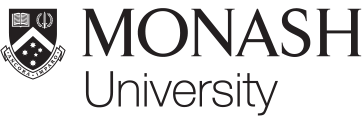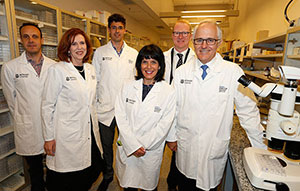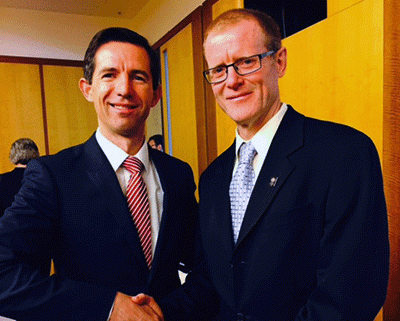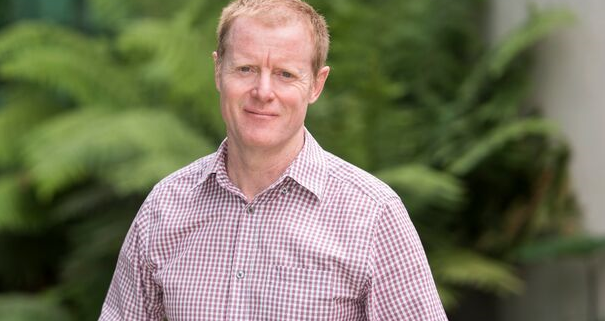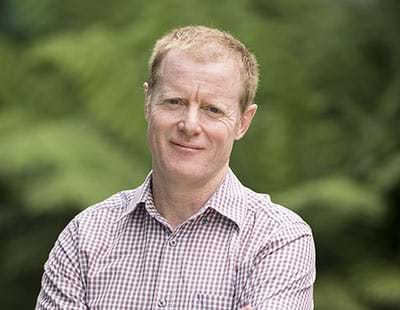Four of the NHMRC’s 20 top prizes for excellence in health and medical research have been awarded to Monash researchers.
The National Health and Medical Research Council’s Research Excellence Awards are presented to the top-ranked applicants across NHMRC’s funding schemes.
Professor Jamie Rossjohn, Associate Professor Allen Cheng, Associate Professor Terry Haines and Dr Michael Roche all from the Faculty of Medicine, Nursing and Health Sciences, will accept their awards at the NHMRC’s 200th Council Dinner this evening.
Federal Minister for Health Peter Dutton will present the awards, which highlight innovative and potentially transformative research.
NHMRC Australia Fellow Professor Rossjohn, who is to receive the Highest Ranked Project Grant, is a leading international expert on processes central to infection and immunity.
The grant will allow him to further investigate a type of T-cell, termed MAIT cell, that is found in abundance in the gastrointestinal system. The research may pave the way for the development of drugs that could either stimulate or suppress activity of this type of T-cell, potentially improving treatments for conditions such as tuberculosis and inflammatory bowel disease.
“My colleagues and I were delighted to receive NHMRC project grant funding to continue our work on MAIT cells and by the subsequent recognition by the NHMRC,” Professor Jamie Rossjohn said.
Associate Professor Allen Cheng from the Department of Epidemiology and Preventive Medicine receives the Highest Ranked Career Development Fellowship – Clinical, Level 2.
Based in the Department of Epidemiology & Preventative Medicine, Associate Professor Cheng is also Deputy Head of the Infection Prevention and Healthcare Epidemiology Unit at Alfred Health in Melbourne.
The Fellowship will enable Associate Professor Cheng to research ways to prevent and treat significant infections.
“I’m grateful to the NHMRC for their support in allowing me to combine research with my clinical work – I feel that it is important to provide evidence that supports clinical and public health practice. It’s also great to work with colleagues at Alfred Health and Monash University who have been well represented amongst recipients of NHMRC Career Development Fellowships in recent years,” Associate Professor Cheng said.
Associate Professor Terry Haines, Director of the Allied Health Research Unit at Monash Health and Director of Research for the Southern Physiotherapy, receives the Highest Ranked Career Development fellowship – Population Health, Level 2.
A physiotherapist and health economist, Associate Professor Haines focuses on health services research across a range of health care settings.
“It is a great honour to be recognised by the NHMRC with this award. In saying this, I would recognise that my success would not be possible without the contributions of staff at Monash Health where I am based, and the many colleagues who I collaborate with locally, nationally, and internationally,” Associate Professor Haines said.
The Fellowship will see Associate Professor Haines lead several projects including a trial introducing GPs as staff at aged-care facilities to reduce hospital admissions and improve resident care. He will also evaluate the benefits and cost effectiveness of weekend allied health services on acute medical and surgical wards.
The NHMRC Research Excellence Awards also include some special categories to acknowledge highly promising up and coming researchers in NHMRC’s Project Grants scheme.
Dr Michael Roche from the Department of Infectious Diseases will be awarded the Frank Fenner Early Career Fellowship.
Focusing on the earliest steps of the HIV life cycle, Dr Roche’s PhD looked at how the virus became resistant to a new antiviral drug, earning him the prestigious Mollie Holman Medal from the University.
“It’s quite an honour to receive this award from the NHMRC,” Dr Roche said.
He added that the award is also a credit to his PhD supervisor Professor Paul Gorry at the Burnet Institute and reflected the high standing of Professor Sharon Lewin’s laboratory at the Department of Infectious Diseases.
For more information on the NHMRC Excellence Awards visit the NHMRC website.
Original article
